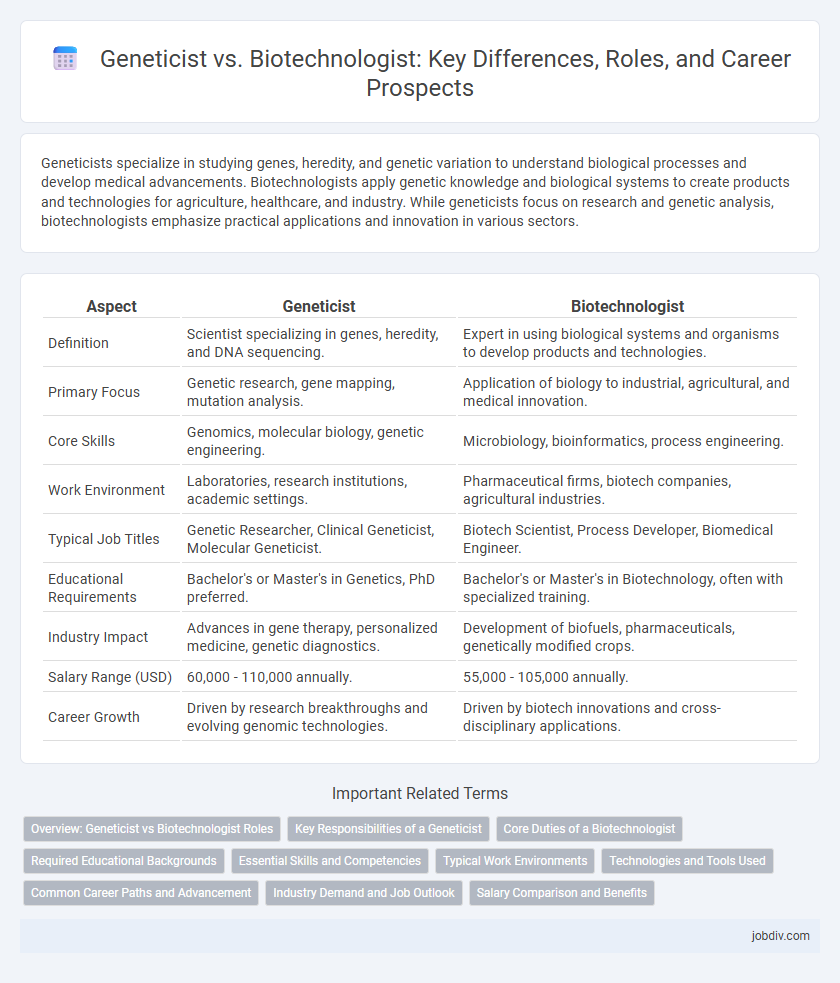Geneticists specialize in studying genes, heredity, and genetic variation to understand biological processes and develop medical advancements. Biotechnologists apply genetic knowledge and biological systems to create products and technologies for agriculture, healthcare, and industry. While geneticists focus on research and genetic analysis, biotechnologists emphasize practical applications and innovation in various sectors.
Table of Comparison
| Aspect | Geneticist | Biotechnologist |
|---|---|---|
| Definition | Scientist specializing in genes, heredity, and DNA sequencing. | Expert in using biological systems and organisms to develop products and technologies. |
| Primary Focus | Genetic research, gene mapping, mutation analysis. | Application of biology to industrial, agricultural, and medical innovation. |
| Core Skills | Genomics, molecular biology, genetic engineering. | Microbiology, bioinformatics, process engineering. |
| Work Environment | Laboratories, research institutions, academic settings. | Pharmaceutical firms, biotech companies, agricultural industries. |
| Typical Job Titles | Genetic Researcher, Clinical Geneticist, Molecular Geneticist. | Biotech Scientist, Process Developer, Biomedical Engineer. |
| Educational Requirements | Bachelor's or Master's in Genetics, PhD preferred. | Bachelor's or Master's in Biotechnology, often with specialized training. |
| Industry Impact | Advances in gene therapy, personalized medicine, genetic diagnostics. | Development of biofuels, pharmaceuticals, genetically modified crops. |
| Salary Range (USD) | 60,000 - 110,000 annually. | 55,000 - 105,000 annually. |
| Career Growth | Driven by research breakthroughs and evolving genomic technologies. | Driven by biotech innovations and cross-disciplinary applications. |
Overview: Geneticist vs Biotechnologist Roles
Geneticists primarily study genes, heredity, and genetic variation to understand the molecular basis of traits and diseases, often conducting research in laboratories or clinical settings. Biotechnologists apply biological systems and organisms to develop products and technologies in industries like agriculture, pharmaceuticals, and environmental science. Both roles require expertise in molecular biology, but geneticists focus on genetic analysis and disease research, while biotechnologists emphasize practical applications and innovation in technology development.
Key Responsibilities of a Geneticist
A Geneticist primarily focuses on studying genes, heredity, and genetic variation in organisms to understand and address medical, agricultural, or environmental challenges. Their responsibilities include conducting genetic research, analyzing DNA sequences, diagnosing genetic disorders, and developing gene therapies. They utilize advanced laboratory techniques such as CRISPR, PCR, and genome sequencing to investigate genetic mutations and inheritance patterns.
Core Duties of a Biotechnologist
A biotechnologist conducts research and develops technologies using biological systems to create products that improve health, agriculture, and the environment. Their core duties include genetic manipulation, fermentation process optimization, and bioprocess engineering. They apply molecular biology techniques to innovate pharmaceuticals, biofuels, and genetically modified organisms.
Required Educational Backgrounds
Geneticists typically require a strong foundation in genetics, biology, and chemistry, often holding a bachelor's degree in genetics, molecular biology, or a related field, with many advancing to a master's or PhD for specialized research roles. Biotechnologists generally pursue degrees in biotechnology, microbiology, or biochemistry, emphasizing applied sciences and technological methods, frequently supported by practical laboratory experience during undergraduate studies. Advanced positions in both fields may demand doctoral-level education combined with interdisciplinary coursework in bioinformatics, molecular genetics, and bioprocessing techniques.
Essential Skills and Competencies
Geneticists require advanced analytical abilities, proficiency in molecular biology techniques, and a strong understanding of genetic variation and inheritance patterns to conduct precise research and diagnostics. Biotechnologists must excel in applied laboratory skills, innovation in biological processes, and expertise in genetic engineering and bioinformatics tools to develop commercial products and solutions. Both professions demand strong problem-solving capabilities, attention to detail, and proficiency in data analysis software to interpret complex biological data accurately.
Typical Work Environments
Geneticists typically conduct research in academic institutions, medical laboratories, and government agencies focused on genetics and molecular biology. Biotechnologists often work in industrial settings, including pharmaceutical companies, agricultural firms, and environmental agencies, applying biological processes to develop products and technologies. Both professionals may collaborate in interdisciplinary labs, but their work environments differ based on research goals versus product development.
Technologies and Tools Used
Geneticists primarily utilize technologies such as gene sequencing, CRISPR-Cas9 gene editing, and polymerase chain reaction (PCR) to analyze and manipulate DNA sequences. Biotechnologists employ a broader array of tools that include fermentation bioreactors, recombinant DNA technology, and bioinformatics software to engineer organisms for industrial and pharmaceutical applications. Both fields rely heavily on advanced laboratory equipment like spectrophotometers and microarrays, but geneticists focus more on molecular analysis while biotechnologists emphasize applied biological systems.
Common Career Paths and Advancement
Geneticists often pursue careers in research, clinical genetics, or academia, focusing on gene analysis, hereditary diseases, and genetic testing advancements. Biotechnologists typically advance in pharmaceuticals, agriculture, or industrial biotechnology sectors, leveraging genetic engineering, molecular biology, and bioinformatics to develop innovative products. Career progression for both may lead to senior scientist roles, project management, or specialized consulting positions, with opportunities expanding through advanced degrees and continuous technical skill development.
Industry Demand and Job Outlook
The demand for geneticists is rapidly increasing due to advancements in personalized medicine and genomic research, with job growth projected at 17% over the next decade according to the U.S. Bureau of Labor Statistics. Biotechnologists also experience strong industry demand, particularly in pharmaceuticals, agriculture, and environmental sectors, with a job outlook growth rate of approximately 15%. Companies investing in gene editing technologies and biopharmaceutical development drive employment opportunities for both geneticists and biotechnologists, making expertise in molecular biology and bioinformatics highly valuable.
Salary Comparison and Benefits
Geneticists typically earn a salary range of $60,000 to $120,000 annually, reflecting their expertise in analyzing genetic data and conducting research, while biotechnologists often receive between $55,000 and $110,000, depending on industry and experience. Benefits for geneticists often include research grants, health insurance, and opportunities for publication, whereas biotechnologists frequently gain access to patent rights, performance bonuses, and professional development programs. Both careers offer strong growth potential in pharmaceuticals, healthcare, and agriculture, with compensation packages varying widely based on specialization and geographic location.
Geneticist vs Biotechnologist Infographic

 jobdiv.com
jobdiv.com